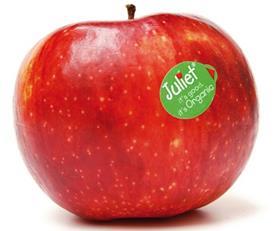
Singapore Fruits Importers & Exporters Exchange (SFE) has single-handedly carved out a market for premium French organic Juliet apples in Singapore and beyond, within just five years.
The variety, exclusively supplied by French grower-shipper Cardell Export to SFE for distribution in Asia, costs almost three times more than the average apple sold in Singapore. Yet, through determination and perseverance, SFE succeeded in not only establishing a firm market for Juliet in Singapore, but also in Malaysia, Indonesia, Taiwan, and also, soon, Thailand.
“At first it was considered an expensive apple and there were no promotions, so we sold less than a container that year,”” remembers SFE’s Tony Tan.
“In the second year, with still no promotion, we sold one and a half containers through word of mouth recommendations: its sweet flavour, crunchy texture and long shelf-life. That year I had bought 900 trays with my own money to give as gifts at a function and informed people there that Juliet apples were available in supermarkets.”
In the third year, Tan convinced his French partners to fund some small-scale promotions, which paid dividends: SFE sold 3.5 containers of Juliet apples that year.
“From then on, we put in more funds for promoting Juliet apples, and the volumes doubled in the fourth year,” says Tan. “This is the fifth year we are selling in Singapore, as well as to Malaysia, Indonesia and Taiwan. And soon we hope to sell to Thailand.”
SFE is also working hard to create a market for Belgian conference pears in Singapore – this time with heavy promotions from the outset, but it’s slow going.
“The Asian market prefers to eat green and clean-textured pears, so it is difficult to sell these partially-russetted conference pears even with promotions and tastings,” explains Tan. “We have promoted it as a ‘special pear’ that can be eaten right to the core because there is practically no stem. Now most consumers can accept the russet skin, but are not too willing to pay high price for it.”
Tan is nonetheless optimistic about the future market for this pear. “With a good product, lots of promotion and with the support of supermarkets and consumers, the product will go well,” he says.
SFE was established in 1976 at a time when fruit sales in Singapore were predominantly in the hands of wholesalers and street vendors.
“Supermarkets were handling less than 5 per cent of fruit and vegetable sales. Then about 15 years ago supermarkets started to become more important,” says Tan.
“They started to handle strawberries and blueberries, and so on. Over the last five years, supermarkets have asked for fruit to be pre-packed. Now they handle about 60 per cent of the fresh produce retail trade, thus taking the position of wholesalers.”
In order to survive, SFE adapted to the changing retail climate and began supplying supermarkets about 15 years ago. “We are now servicing the wholesalers and supermarkets at the same time,” says Tan. “We try to service all the supermarkets in Singapore and provide them with new varieties of fruits they require.Demand from supermarkets is getting more important and competition between supermarkets is getting more aggressive.”
Singapore’s fruit import market was steady last year in terms of demand, price and sales, according to Tan. “The currency was steady and turnover trade was good,although prices from many countries have gone up,” he says.“Last year we saw a sharp rise in the price of China Fuji apples due to lack of supplies, and this helped sales of apples from other sources, especially New Zealand.”
The shortage of California oranges also helped boost sales of Valencias from Egypt, adds Tan. “Over the years, the Singapore market has increased its imports of all fresh fruitsfrom many countries,” he concludes.



